GALLUP NEWS SERVICE
PRINCETON, NJ -- The latest CNN/USA Today/Gallup poll shows that a slight majority of Americans support invading Iraq to remove Saddam Hussein from power, about the same level of support observed over the past several months. But the poll also shows that most Americans are taking a wait-and-see attitude about an invasion of Iraq, as the inspections in Iraq unfold. Most Americans say their ultimate feelings about military action against Iraq will depend on what happens in that country over the next few weeks, as U.N. inspectors look for signs that Iraq either has, or is trying to develop, weapons of mass destruction. About 8 in 10 Americans are following this news event closely (3 in 10 "very closely"), ranking it among the top fifth of news stories in the past several years.
The poll also shows that the public is highly skeptical about Iraq's response to U.N. demands. Large majorities of Americans believe that the report Iraq submitted to the United Nations last week is not accurate or complete, that Iraq either has, or is developing, weapons of mass destruction, that inspectors will not be able to find these weapons, and that Saddam will attempt to block inspectors from gaining access to a suspected weapons site at some point. In fact, Americans overwhelmingly believe that the only way to disarm Iraq is to remove Saddam from power. They also say that if it comes to a conflict between what the U.N. inspectors find and what the Bush administration says, they would be more inclined to trust the latter.
Despite skepticism about the inspections' effectiveness and their greater trust of the Bush administration than the United Nations, Americans continue to advocate that the United States work through the United Nations before any invasion of Iraq. Most Americans want the United States to defer an invasion of Iraq until inspectors find evidence that would confirm U.S. accusations that the Iraqi report is not accurate. And Americans also say that if the United States claims to have evidence that Iraq has weapons of mass destruction, then the United States should make that evidence publicly available.
Wait-and-See Attitude
The poll, conducted Dec. 9-10, finds that 55% of Americans say they support an invasion of Iraq, while 39% are opposed. Since August, support has averaged 56%, while opposition has averaged 38%, showing that the current level of support is close to what it has been for the past 3 months.
| Public Support for Invading Iraq 2001-2002 |
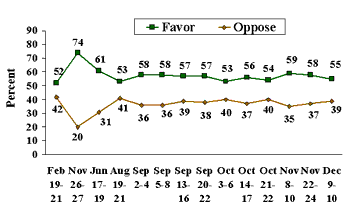 |
Among people who support an invasion, 28% say they support it regardless of what happens in the next few weeks, but 69% say their support depends on what happens during that time frame. Similar responses are found among those who say they oppose an invasion: 67% say their opinion depends on what happens, while 31% say they are opposed regardless.
Overall, these follow-up questions show that only 15% of Americans want to go to war regardless of what the U.N. inspections produce or how Saddam reacts in the next few weeks, and that only 12% are opposed to war regardless of what happens. The rest of Americans, two out of three, are taking a wait-and-see attitude -- their support or opposition is contingent on the activity occurring in Iraq.
| Attitudes About Invading Iraq Mostly Depend
on What Happens in Next Few Weeks |
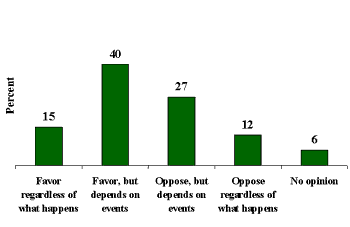 |
| Dec. 9-10, 2002 |
A Matter of Trust
While many Americans say they will base their opinions about an invasion of Iraq on what happens in the next several weeks, it is also clear that most average citizens cannot make accurate judgments about the implications of the Iraqi documents or what U.N. inspectors find. This sets up a situation in which Americans must place a great deal of trust in others' interpretations of what is happening. The survey asked Americans several questions about their relative level of trust of the Bush administration and the United Nations. Overall, 66% of Americans say they trust the Bush administration, either a great deal or a moderate amount, to make the right decisions about Iraq, compared with 65% who express that level of trust about the United Nations. While the percentages are virtually identical, there are many more Americans who say they have a "great deal" of trust in their own government (32%) than in the United Nations (13%).
| How Much Trust in -- Bush Administration/United Nations -- to Make Right Decisions About Iraq? |
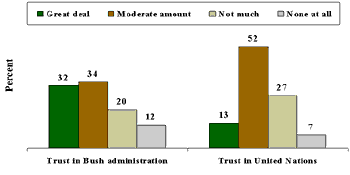 |
| Dec. 9-10, 2002 |
This greater trust in the Bush administration is reflected in the results of a separate question, which asked whom Americans would trust if U.N. weapons inspectors say they have not found any weapons of mass destruction, while the Bush administration says it has such evidence. By 52% to 36%, Americans would accept the judgment of the Bush administration over that of the U.N. inspectors.
Skepticism About Iraq
The poll also shows that Americans have a great deal of skepticism about Iraq's response to U.N. demands.
- By 91% to 7%, they say the report Iraq submitted to the United Nations is not accurate or complete.
- Sixty-three percent of Americans say Iraq currently has weapons of mass destruction, while another 28% say Iraq is trying to develop such weapons. Only 4% believe Iraq is not trying to develop these weapons.
- Among those who believe that Iraq has the weapons or is trying to develop them, 45% express a high degree of confidence that the U.N. inspectors will be able to find them, but 55% say they have little or no confidence the weapons can be found.
- Among all Americans, 78% expect that Saddam will block U.N. access to a weapons site at some point in the inspection process, while only 19% believe he will provide access to any sites the inspectors want to visit.
- By 81% to 14%, Americans believe that the only way to disarm Iraq is to remove Saddam from power.
Importance of Working Through the United Nations
While Americans express less trust in the United Nations than in the Bush administration on the matter of Iraq, and also express skepticism that the U.N. inspectors will be able to find weapons of mass destruction, they still express support for the U.N. process. By more than a 2-to-1 majority, 66% to 30%, they say that even if the United States believes the Iraqi report is not accurate, the United States should wait for the U.N. inspectors to find confirming evidence before launching an invasion. This is in line with the results of a number of questions asked in previous polls which underscore the degree to which Americans want U.N. involvement before any decision to go to war is made.
| Should the United States Wait for U.N. Inspectors to Find Evidence That the Iraqi Report Is Inaccurate Before Invading Iraq? |
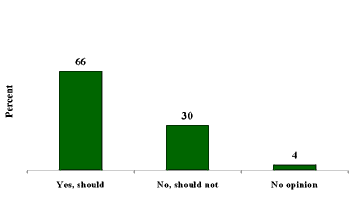 |
| Dec. 9-10, 2002 |
Also, the public says, by 62% to 35%, that the Bush administration's claims of evidence that Iraq has weapons of mass destruction should be publicly released -- if it plans to use the evidence to justify an invasion of Iraq.
| Does the United States Need to Release Its Evidence That Iraq Has Weapons of Mass Destruction to Justify an Invasion? |
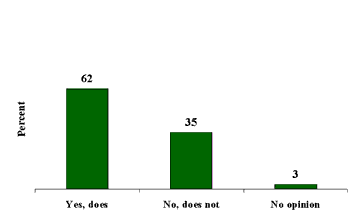 |
| Dec. 9-10, 2002 |
These views are consistent with a previous Gallup Poll, conducted Nov. 22-24, showing support for U.N. involvement. By close to a 2-to-1 majority, Americans said that if Iraq is found not to have complied with the U.N. resolution that requires it to disarm, the United States should first go back to the United Nations and get approval before invading Iraq to remove Saddam from power.
News of Inspections One of Most Closely Followed Events in Past Year
The vast majority of Americans, 80%, have followed the news about the inspections in Iraq either very closely (30%) or somewhat closely (50%). This degree of attention is similar to that paid by the public to the situation in Kosovo in March and April 1999, when the United States and its NATO allies were intervening militarily against the Serbs to stem further violence in the area. Among all events Gallup has measured in the past decade, the news story about the inspections in Iraq ranks in the top 20% in the amount of public attention given to it.
Survey Methods
The latest results are based on telephone interviews with 1,009 national adults, aged 18 and older, conducted Dec. 9-10, 2002. For results based on the total sample of national adults, one can say with 95% confidence that the margin of sampling error is ±3 percentage points. In addition to sampling error, question wording and practical difficulties in conducting surveys can introduce error or bias into the findings of public opinion polls.
Would you favor or oppose invading Iraq with U.S. ground troops in an attempt to remove Saddam Hussein from power?
|
Favor |
Oppose |
No opinion |
||
|
% |
% |
% |
||
|
2002 Dec 9-10 |
55 |
39 |
6 |
|
|
2002 Nov 22-24 |
58 |
37 |
5 |
|
|
2002 Nov 8-10 |
59 |
35 |
6 |
|
|
2002 Oct 21-22 |
54 |
40 |
6 |
|
|
2002 Oct 14-17 ^ |
56 |
37 |
7 |
|
|
2002 Oct 3-6 |
53 |
40 |
7 |
|
|
2002 Sep 20-22 ^ |
57 |
38 |
5 |
|
|
2002 Sep 13-16 † |
57 |
39 |
4 |
|
|
2002 Sep 5-8 ^ † |
58 |
36 |
6 |
|
|
2002 Sep 2-4 † |
58 |
36 |
6 |
|
|
2002 Aug 19-21 † |
53 |
41 |
6 |
|
|
2002 Jun 17-19 ^ † |
61 |
31 |
8 |
|
|
2001 Nov 26-27 ‡ |
74 |
20 |
6 |
|
|
2001 Feb 19-21 ‡ |
52 |
42 |
6 |
|
|
1993 Jun 29-30 ‡ |
70 |
27 |
3 |
|
|
1992 Mar 30-Apr 5 ‡ # |
55 |
40 |
5 |
|
|
^ |
Asked of half sample. |
|||
|
† |
WORDING: Would you favor or oppose sending American ground troops to the Persian Gulf in an attempt to remove Saddam Hussein from power in Iraq? |
|||
|
‡ |
WORDING: Would you favor or oppose sending American troops back to the Persian Gulf in order to remove Saddam Hussein from power in Iraq? |
|||
|
# |
Life Magazine/Gallup. |
|||
How closely have you been following the news about the U.N. weapons inspections currently being conducted in Iraq and the report Iraq filed this past weekend concerning weapons of mass destruction -- very closely, somewhat closely, not too closely, or not at all?
|
Very |
Somewhat closely |
Not too closely |
|
No |
|
|
2002 Dec 9-10 |
30% |
50 |
14 |
6 |
* |
Would you favor invading Iraq with U.S. ground troops regardless of what happens in Iraq over the next few weeks, or does your opinion on invading Iraq depend on what happens in Iraq over the next few weeks?
BASED ON --548-- ADULTS WHO FAVOR INVADING IRAQ WITH U.S. GROUND TROOPS IN AN ATTEMPT TO REMOVE SADDAM HUSSEIN FROM POWER
|
Would favor regardless |
Depends on |
No |
|
|
2002 Dec 9-10 |
28% |
69 |
3 |
Would you oppose invading Iraq with U.S. ground troops regardless of what happens in Iraq over the next few weeks, or does your opinion on invading Iraq depend on what happens in Iraq over the next few weeks?
BASED ON --406-- ADULTS WHO OPPOSE INVADING IRAQ WITH U.S. GROUND TROOPS IN AN ATTEMPT TO REMOVE SADDAM HUSSEIN FROM POWER
|
Would oppose regardless |
Depends on |
No |
|
|
2002 Dec 9-10 |
31% |
67 |
2 |
COMBINED RESPONSES (Q.8, Q.10-11)
|
2002 Dec 9-10 |
||
|
Favor invading Iraq with U.S. ground troops in an attempt to remove Saddam |
55 |
|
|
(Would favor regardless of what happens over the next few weeks) |
(15) |
|
|
(Depends on what happens over the next few weeks) |
(40) |
|
|
Oppose invading Iraq with U.S. ground troops in an attempt to remove Saddam |
39 |
|
|
(Would oppose regardless of what happens over the next few weeks) |
(12) |
|
|
(Depends on what happens over the next few weeks) |
(27) |
|
|
No opinion |
6 |
|
Do you think the United States has done all it can do to solve the crisis with Iraq diplomatically, or not?
|
Yes, has |
No, has not |
No opinion |
|
|
% |
% |
% |
|
|
2002 Dec 9-10 |
52 |
44 |
4 |
|
2002 Oct 3-6 |
46 |
49 |
5 |
|
1991 Jan 11-13 |
60 |
33 |
7 |
How much trust do you have in the Bush administrationto make the right decisions regarding Iraq -- a great deal, a moderate amount, not much, or none at all?
BASED ON --532-- NATIONAL ADULTS IN FORM A
|
Great |
Moderate amount |
|
|
No |
|
|
2002 Dec 9-10 |
32% |
34 |
20 |
12 |
2 |
How much trust do you have in the United Nationsto make the right decisions regarding Iraq -- a great deal, a moderate amount, not much, or none at all?
BASED ON --477-- NATIONAL ADULTS IN FORM B
|
Great |
Moderate amount |
|
|
No |
|
|
2002 Dec 9-10 |
13% |
52 |
27 |
7 |
1 |
Do you think Iraq currently has weapons of mass destruction, is trying to develop these weapons but does not currently have them, or is not trying to develop weapons of mass destruction?
|
|
Is trying to develop weapons |
Is not trying |
|
||
|
% |
% |
% |
% |
||
|
2002 Dec 9-10 |
63 |
28 |
4 |
5 |
|
|
2002 Nov 22-24 |
66 |
27 |
2 |
5 |
|
|
2002 Aug 19-21 |
55 |
39 |
1 |
5 |
|
|
2002 Feb 8-10 ^ |
55 |
40 |
2 |
3 |
|
|
^ |
WORDING: Do you think -- [RANDOM ORDER: Iran, Iraq, North Korea] -- currently has weapons of mass destruction, is trying to develop these weapons but does not currently have them, or is not trying to develop weapons of mass destruction? |
||||
How confident are you that the U.N. inspectors will be able to find weapons of mass destruction or the programs to develop them in Iraq -- very confident, somewhat confident, not too confident, or not at all confident?
BASED ON --512-- ADULTS IN FORM A WHO SAY IRAQ CURRENTLY HAS WEAPONS OF MASS DESTRUCTION, IS TRYING TO DEVELOP THEM, OR ARE UNSURE IF IRAQ HAS THEM
|
Very confident |
Somewhat confident |
Not too confident |
Not at all confident |
No |
|
|
2002 Dec 9-10 |
8% |
37 |
38 |
17 |
* |
If weapons of mass destruction or programs to develop them exist in Iraq, do you think -- [ROTATED: the U.N. inspectors will be able to find them, (or do you think) Iraq has hidden them so well that the U.N. inspectors will not be able to find them]?
BASED ON --460-- ADULTS IN FORM B WHO SAY IRAQ CURRENTLY HAS WEAPONS OF MASS DESTRUCTION, IS TRYING TO DEVELOP THEM, OR ARE UNSURE IF IRAQ HAS THEM
|
Will be able |
Will not be able |
No |
|
|
2002 Dec 9-10 |
22% |
73 |
5 |
As you may know, in the past few weeks, Saddam Hussein has allowed U.N. inspectors access to all of the sites they have requested to inspect. In the future, do you think Saddam Hussein will -- [ROTATED: continue to allow U.N. inspectors access to any site they wish to inspect, (or do you think he will) at some point block U.N. inspectors from inspecting at least one of the sites]?
|
Continue to |
Block at some point |
No |
|
|
2002 Dec 9-10 |
19% |
78 |
3 |
As you may know, the U.N. resolution passed in November required Iraq to make an "accurate, full and complete" report of all weapons of mass destruction it currently has. This past weekend, Iraq submitted a report to the U.N. that says that Iraq has no weapons of mass destruction.
Based on what you have heard or read, do you think the report Iraq gave the U.N. this past weekend is accurate, full, and complete, or not?
|
Yes, is accurate, |
|
No |
|
|
2002 Dec 9-10 |
7% |
91 |
2 |
If the United States believes Iraq's report to the U.N. is not accurate, do you think the United States should -- or should not -- wait for the U.N. inspectors to find evidence that confirms that Iraq does have weapons of mass destruction before it decides whether to invade Iraq?
|
Yes, should |
No, should not |
No opinion |
|
|
2002 Dec 9-10 |
66% |
30 |
4 |
As you may know, the Bush administration says it has evidence that Iraq currently has weapons of mass destruction. Do you think the United States does -- or does not -- need to release this evidence publicly in order to justify invading Iraq with ground troops?
|
Yes, does |
No, does not |
No opinion |
|
|
2002 Dec 9-10 |
62% |
35 |
3 |
If the Bush administration says it has evidence of weapons of mass destruction in Iraq AND the U.N. inspectors say they have not found any evidence of these weapons, who would you be more likely to believe -- [ROTATED: the Bush administration (or) the United Nations' inspectors]?
|
|
U.N. inspectors |
Both equally (vol.) |
|
|
|
|
2002 Dec 9-10 |
52% |
36 |
4 |
3 |
5 |
Which comes closer to your view -- [ROTATED: it is possible to disarm Iraq without removing Saddam Hussein from power, (or) the only way to disarm Iraq is to remove Saddam Hussein from power]?
|
Possible to disarm |
Only way to |
|
|
|
2002 Dec 9-10 |
14% |
81 |
5 |
